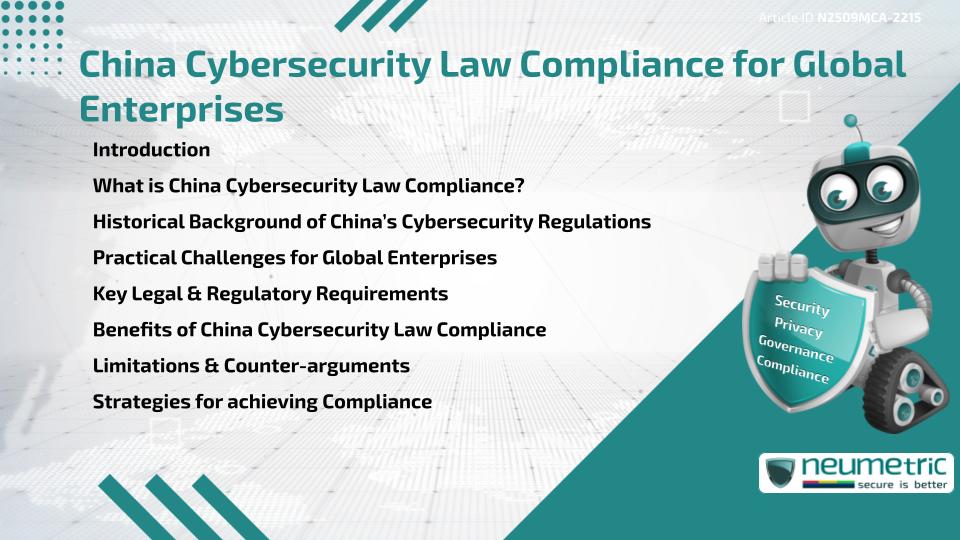Table of Contents
ToggleIntroduction
China CyberSecurity Law Compliance is a top priority for Global Enterprises operating in the Chinese Market. Introduced in 2017, the CyberSecurity Law of the People’s Republic of China created a Legal Framework for Data Security, Network Operations & Personal Information protection. For Multinational Companies, Compliance means balancing business opportunities in China with strict Regulatory demands. This article explains its history, challenges, benefits & practical strategies for Enterprises navigating the Law.
What is China CyberSecurity Law Compliance?
China CyberSecurity Law Compliance refers to aligning Business Practices with Regulations that Govern Data collection, storage & transfer within China. It applies to both Domestic & Foreign Companies offering Services or Products in the Country. The Law emphasises Data Localisation, Personal Information protection & Network Security, requiring Enterprises to adopt Robust Governance Models.
Historical Background of China’s CyberSecurity Regulations
The rise of China’s Digital economy prompted the Government to prioritise National Security & Digital Sovereignty. Before 2017, Regulations were Fragmented across Industries. The CyberSecurity Law consolidated these rules, giving Authorities more control over How companies collect & manage data. Later additions, such as the Data Security Law 2021 & the Personal Information Protection Law (2021), expanded obligations for Enterprises & Increased Penalties for Non-compliance.
Practical Challenges for Global Enterprises
Global Enterprises face significant obstacles when implementing China CyberSecurity Law Compliance. Data localisation requirements often force Companies to build or partner with Local Data Centers, raising costs. Cross-border Data transfer restrictions complicate Global Operations, especially for Enterprises relying on International Analytics or Cloud Services. Additionally, vague definitions within the Law create uncertainty, making Legal interpretation difficult.
Key Legal & Regulatory Requirements
The core aspects of Compliance include:
- Storing critical Information Infrastructure & Personal Data within China
- Undergoing Security Assessments before Transferring Data abroad
- Adopting Technical safeguards against Cyber Threats
- Establishing clear Policies for collecting, using & sharing Personal Data
Guidelines from the Cyberspace Administration of China provide additional instructions for implementation. Global Enterprises often require Legal experts to interpret these rules & align them with Internal Policies.
Benefits of China CyberSecurity Law Compliance
Compliance offers more than just Risk avoidance. It helps Enterprises gain Trust from Local Customers & Partners by demonstrating respect for National Laws. It also improves Internal Data Governance & Strengthens overall CyberSecurity Posture. By embedding Compliance into daily Operations, Companies can create Long-term stability in one of the World’s largest Digital Markets.
Limitations & Counter-arguments
Critics argue that the Law creates barriers to trade & increases costs for International Companies. Some believe that Localisation Rules limit innovation & reduce efficiency by restricting Data flows. Furthermore, Compliance does not guarantee immunity from Cyberattacks, leading to concerns about whether the Regulatory burden outweighs its benefits.
Strategies for achieving Compliance
To manage China CyberSecurity Law Compliance effectively, Enterprises can adopt hybrid approaches:
- Partnering with Licensed Local Cloud Providers
- Conducting regular Risk Assessments & Internal Audits
- Training Employees on Legal Obligations & Secure Data Handling
- Using Frameworks like OECD Privacy guidelines & World Bank Governance insights for context
These strategies help organisations align Legal requirements with Global Best Practices.
Takeaways
China CyberSecurity Law Compliance is both a Legal obligation & a strategic necessity for Global Enterprises. While it creates Operational challenges, it also enhances trust, strengthens Governance & Opens doors to sustainable growth in the Chinese Market.
FAQ
What does China CyberSecurity Law Compliance involve?
It involves aligning business practices with China’s rules on Data Security, Localisation & Cross-border Transfers.
Who must follow the Law in China?
Both domestic & foreign Companies offering Services or Products in China must comply.
What are the main challenges for Global Enterprises?
Key challenges include Data Localisation Costs, restrictions on Cross-border transfers & complex Regulatory interpretation.
Does Compliance improve CyberSecurity?
Yes, it strengthens Governance & reduces Risks, though it does not eliminate Cyber Threats completely.
How can Enterprises achieve Compliance more effectively?
By partnering with Local Providers, Conducting Audits, Training Staff & Aligning Internal Practices with International Guidelines.
References
- Cyberspace Administration of China
- OECD Privacy Guidelines
- World Bank Digital Development
- Council on Foreign Relations – Data Governance
- Privacy International Resources
Need help for Security, Privacy, Governance & VAPT?
Neumetric provides organisations the necessary help to achieve their CyberSecurity, Compliance, Governance, Privacy, Certifications & Pentesting needs.
Organisations & Businesses, specifically those which provide SaaS & AI Solutions in the Fintech, BFSI & other regulated sectors, usually need a CyberSecurity Partner for meeting & maintaining the ongoing Security & Privacy needs & requirements of their Enterprise Clients & Privacy conscious Customers.
SOC 2, ISO 27001, ISO 42001, NIST, HIPAA, HECVAT, EU GDPR are some of the Frameworks that are served by Fusion – a SaaS, multimodular, multitenant, centralised, automated, CyberSecurity & Compliance Management system.
Neumetric also provides Expert Services for technical Security which covers VAPT for Web Applications, APIs, iOS & Android Mobile Apps, Security Testing for AWS & other Cloud Environments & Cloud Infrastructure & other similar scopes.
Reach out to us by Email or filling out the Contact Form…


